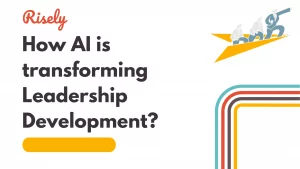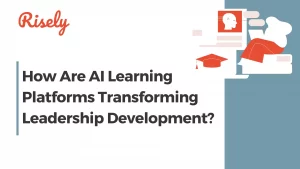Informal Learning: All You Need To Know
Lifelong learning is now more important than ever, in this changing world. While formal learning offers a controlled approach, most of the skills your employees apply daily come from informal learning. It is only natural; whether it occurs through day-to-day experiences, conversations among peers, or from personal exploration, etc. In this blog, we’ll look at why informal learning matters for the growth of your team and provide actionable insights on how you, as a leader, can encourage and cultivate it within your organization.What is Informal Learning?
Informal learning is any type of learning that happens outside a set plan or curriculum. This type of learning is spontaneous and directed by personal interest or the need to learn something new.
Informal learning occurs naturally through day-to-day interaction, direct experiences, or individual exploration. Whether it be the manner in which employees share ideas, watch other team members, or address a problem as it comes up, informal learning has a seat at the table helping teams learn and grow.Key Examples of Informal Learning at Work
- Peer-to-Peer Learning: Employees often turn to their coworkers for advice, guidance, and knowledge-sharing through conversations or collaborative projects.
- On-the-Job Learning: Employees learn through hands-on experiences in on-the-job training as they encounter and solve real-time challenges.
- Self-Directed Learning: Team members frequently seek out resources—whether videos, articles, or webinars—to deepen their understanding of specific topics.
Advantages of Informal Learning
It offers your organization several benefits that align with your L&D objectives.- Relevance and Immediate Application: Informal learning is learned in the natural flow of doing things, so it’s directly applicable, making it practical and impactful.
- Flexibility: Informal learning is more flexible than formal programs because it does not tie up in schedules or rigid structures. Employees enjoy the flexibility to learn in ways that are in suit for them best.
- Encourages Initiative: Informal learning fosters a culture of curiosity and problem-solving skills, which makes your team agile and ready for change.
The Importance of Informal Learning in the Modern Workplace
Formal learning is a traditional more structured approach with set goals, and schedules, and often leads to certifications, while informal learning is unstructured, driven by personal curiosity, and happens naturally through daily experiences. However, the distinction between formal and informal learning is fading with time. In the modern workplace, informal learning has been enhanced with social platforms, online communities, and collaborative tools. Approaches to employee development are increasingly employee-driven. Informal Learning is a way for leaders to establish a culture of continuous learning, allowing your organization to be innovative and adaptable, enabling employees to take charge of their growth.What Are the Benefits of Informal Learning?
Informal learning unlocks many benefits for your employees and organization, that can provide an engaging and personalized learning experience that allows different individuals to adapt to their own style of learning. Your organization should encourage a culture of continuous learning and innovation through self-directed discovery and sharing of knowledge. Listed below are some of the crucial advantages for organizations to adopt:1. Greater Autonomy
Informal learning allows your team to make choices in what and how they learn. They set their own goals and pace how they learn instead of following a rigid plan. Autonomy in the workplace makes people dig deeper into the topics they care about, thus increasing comprehension and creative contributions. In environments where employees are in control, individuals are more engaged and eager to share new ideas.2. More Effective Learning
Learning through informal, hands-on experiences is more effective than traditional training. Your team is more likely to actively solve problems and apply what they are learning immediately. Whether they find a quick solution online or ask a colleague for advice, the method sticks better because it leads to stronger retention and faster skill-building.3. Flexible and Multidimensional
Through articles, forums, webinars, and practical exercises, your team can experiment with various learning approaches through informal learning. Because of this flexibility, they may learn in the ways that work best for them, which results in a more comprehensive and personalized learning experience. Online and in-person communities of practice facilitate idea sharing among your team members, which promotes teamwork and group learning.4. Cost-Effective for Your Business
Compared to formal training programs, informal learning is less expensive. Rather than investing a lot of money in classes, supplies, and instructors, your team can use already-existing resources like peer-to-peer learning or online libraries. You may cut expenses and improve employee development by promoting this type of internal learning.5. Self-Directed Learning
Your team will be more engaged and continue to grow if you give them the freedom to explore subjects that interest them. They may learn at their own speed, go over material again, or go further into topics they are interested in. People are more likely to enthusiastically apply new knowledge and abilities when they are in control of their learning process.6. Low-Stress, High-Impact Environment
In contrast to formal settings, where the stress of deadlines and evaluations can inhibit creativity, informal learning flourishes in a more laid-back, stress-free environment. Consider the effects of organizing a relaxed lunch-and-learn for your team or attending a workshop together; these informal settings make learning fun and maintain everyone’s interest.7. Building a Broader Knowledge Base
Informal learning allows your team to investigate subjects that are outside of their normal purview. This aids in the development of a diverse skill set, which is essential in the ever-evolving workplace of today. Encouragement of continuous learning among team members promotes creativity, flexibility, and problem-solving in general. Prioritizing informal learning not only makes your team better equipped, but it also fosters a vibrant culture where ongoing development is expected. It’s a simple, affordable method to maintain employee motivation, engagement, and readiness for any upcoming problems.How to Implement Informal Learning in the Workplace?
Including informal learning in the workplace does not require a complete overhaul of your training program. All you need are a few easy tactics to stir up employees’ enthusiasm for these learning opportunities. This can foster a culture in which exchanging knowledge is routine. The following easy tips will assist you incorporate informal learning into your company:1. Quizzes and Games
- Boost Engagement: Use small quizzes and games on important topics to help your team remember better and stay interested.
- Gamification: Add game features like leaderboards and nudges to create friendly competition and make learning more enjoyable.
- Interactive Learning: Provide interactive quizzes and simulations for instant feedback and to strengthen the knowledge and skills your team learnt in formal training.
2. Videos and Podcasts
- Multimedia Learning: Use engaging video resources, such as TED Talks, industry webinars, and explainer videos, to aid your team members in their learning.
- Accessible Content: Set up a place where internal training videos and presentations are stored. This will make it easy for employees to find information whenever they need it.
- Language Learning: Use podcasts and audio materials, like RiseUp Radio– a podcast for managers and leaders to unlock their true potential, for quick learning that can be done on the go. This is great for auditory learners and people short on time.
3. Mentoring Programs
- Share Knowledge: Set up formal or casual mentoring programs. Connect experienced workers with those who want help and to learn more.
- Role Models: Motivate senior professionals to become mentors. They can provide helpful advice, talk about their work context, and create a friendly space for learning.
- Reverse Mentoring: Start reverse mentoring programs. This lets younger employees teach their skills in areas like technology, social media, or new trends.
4. Seminars and Conferences
- Industry Insights: Encourage your team to go to seminars, webinars, and conferences that are relevant to the industry. This will help them stay updated on new trends and best practices.
- Networking Opportunities: Offer chances for the team to meet peers, experts, and possible mentors. This helps with professional development and sharing knowledge.
- Knowledge Sharing: Ask the team members who come back from conferences or seminars to share important takeaways and ideas with the other members.
5. Encourage a Knowledge-Share Culture
- Collaboration Platforms: Set up online spaces like chat rooms or forums. This lets employees connect easily, ask questions, and share their skills.
- Social Learning: Promote the use of social learning platforms. Your team will get to follow experts, join discussions, and find useful articles and resources.
- Communities of Practice: Encourage communities of practice in the company. This brings together people with similar interests to work together, learn from one another, and share the best ways to do things.
6. Collate Valuable Resources
- Centralized Repository: Set up a single online space where your team can find articles, e-books, research papers, templates, and other useful learning materials easily.
- Curated Content: Ask experts in the company to gather content and make internal wikis or knowledge bases. This will help to keep information accurate, current, and easy to get.
- Information Repository: Arrange resources by topic, department, or skill level. This will make it easier for employees to look for and find what they need quickly.
7. Offer Social Learning Opportunities
- Peer Interaction: Promote interactions among peers through departmental collaboration, group projects, and enjoyable activities that promote knowledge sharing and mutual learning.
- Collaborative Learning: Use collaborative learning tools, like shared documents, project management software, or virtual whiteboards. These tools allow your team members to work together and share their knowledge in real-time.
- Social Forums: Create online groups or internal social forums. Employees can learn from each other’s experiences by connecting with people who share their interests or challenges.
8. Allocate Time for Learning
- Dedicated Learning Time: Create a culture where people keep learning. Set aside specific time for employees to take part in informal learning, like reading articles, watching webinars, or joining online talks.
- Time Management: Offer training on building time management skills and setting priorities. This helps employees fit learning into their busy lives.
- Lifelong Learning: Encourage a lifelong learning attitude by recognizing and rewarding employees who look for ways to grow and develop. This can happen in the workplace or outside of it.
Challenges and Solutions in Informal Learning
Informal learning has its own set of challenges even though it has numerous benefits. Lack of structure is a common issue that makes your team unclear about where to begin or how to monitor their progress. Employees lose motivation or have trouble locating the appropriate resources if they are not given clear instructions. You tackle this by offering Leadership Learning Journeys, recommending worthwhile resources, and establishing explicit guidelines for informal learning. Employee engagement and motivation to participate will also be maintained with regular check-ins and support. Measuring the influence of informal learning presents another difficulty. It is more difficult to determine how informal learning affects performance than formal programs with predetermined evaluations. You can gain a better understanding of the efficacy of your learning tactics by routinely gathering feedback via surveys, one-on-one meetings, or performance-tracking systems. This enables you to customize your materials and guarantee that informal learning fits perfectly with your organizational goals, giving your team a more fulfilling and effective experience.Conclusion
In conclusion, informal learning is a flexible and helpful way that helps people in many parts of their lives. It gives them the freedom to learn on their own. By using informal learning methods, people can boost their knowledge, skills, and overall growth. Organizations can also gain by using these strategies. This can build a culture where people keep learning and sharing what they know. To make the most of informal learning, it is important to overcome challenges and use feedback to get better. Embrace informal learning to enjoy its many benefits for personal and work growth. If you want to learn more about informal learning, think about using these strategies in your workplace. This will create a more fun and effective learning experience.Avantika holds an undergrad degree in Political Science and Psychology, bringing a unique blend of analytical and psychological insight to her writing. With extensive experience in content creation and research, she crafts engaging and well-informed content that resonates with readers and drives meaningful conversations.
Ready to start your learning journey?
Discover how continuous learning can fuel your growth with Risely’s Leadership Learning Journeys and unlock your true leadership potential!
How to Build a Leadership Journey? ft. Thomas Ulbrich
Effective leadership doesn’t always begin with a grand vision. Sometimes, it takes root in the courage to take the first…
AI and Leadership Development: Driving Synergy for Growth
Sneha MishraApr 14, 2025
AI and Leadership Development: Driving Synergy for Growth You know the frustration all too well. Your organization invests thousands in…
How Are AI Learning Platforms Transforming Leadership Development?
Sneha MishraApr 8, 2025
As an L&D leader, you’re likely familiar with this frustrating reality: 82% of organizations consider leadership development critical(1), yet only…
5 Essential AI Skills for L&D Leaders
Sneha MishraMar 31, 2025
5 Essential AI Skills for L&D Leaders According to LinkedIn’s 2025 Workplace Learning Report(1), 71% of L&D professionals are now…
How to Create a Course with AI: A Guide for L&D Professionals
Sneha MishraMar 20, 2025
How to Create a Course with AI: A Guide for L&D Professionals According to a McKinsey survey(1), only 11% of…







